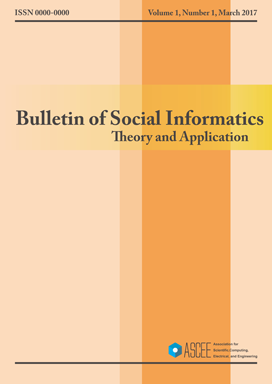TikTok and Indonesian Housewives
DOI:
https://doi.org/10.31763/businta.v6i1.415Keywords:
Social media, TikTok, Snack video, Housewife, Uses and gratification, Deep interviewAbstract
The “TikTok” app, a short music-powered social video platform app. Whether it's dance music, freestyle, or performance. Expressive video-makers to be as creative as possible and imagine freely and express their expressions as funny as possible. Since 2017, the short video industry has been on the rise. The “Tik Tok” application is a music creative short video social software launched in September 2016. In 2017, this application has become the dark horse of many short video applications. The purpose of this study is to determine how the influence of TikTok on housewives. Every individual has a different level of need in using the media. This literature review starts with the use of TikTok social media to its effect on housewives. To meet the objectives of this study, deep interviews were used to collect data from informants.
References
X. Cheng, J. Liu, and C. Dale, “Understanding the Characteristics of Internet Short Video Sharing: A YouTube-Based Measurement Study,” IEEE Trans. Multimed., vol. 15, no. 5, pp. 1184–1194, Aug. 2013, doi: 10.1109/TMM.2013.2265531.
Herrman, “How TikTok is Rewriting the World,” The New York Times, 2019. [Online]. Available: http://res.tigerge.cn/20200713/补充1 How TikTok Is Rewriting the World.pdf.
“App Insights: TikTok | Apptopia,” Accessed May 27, 2021. [Online]. Available: apptopia. https://apptopia.com/ios/app/835599320/intelligence.
S. Yang, Y. Zhao, and Y. Ma, “Analysis of the Reasonsand Development of Short Video Application ——Taking Tik Tok as an Example,” in International Conference on Information and Social Science (ICISS), 2019, vol. 9, no. 62, pp. 340–343.[Online]. Available: https://webofproceedings.org/proceedings_series/article/artId/10287.html.
“Housewife (noun) American English definition and synonyms,” Macmillan Dictionary. [Online]. Available: https://www.macmillandictionary.com/dictionary/american/housewife
D. Novianti and S. Fatonah, “Social Media Literacy For Housewives In Kanoman Maguwoharjo Village, Sleman, Yogyakarta,” in Proceeding of LPPM UPN “VETERAN” Yogyakarta Conference Series 2020-Political and Social Science Series, Oct. 2020, vol. 1, no. 1, pp. 83–92, doi: 10.31098/pss.v1i1.183.
M. Uddin, “Addressing work-life balance challenges of working women during COVID-19 in Bangladesh,” Int. Soc. Sci. J., vol. 71, no. 239–240, pp. 7–20, Mar. 2021, doi: 10.1111/ISSJ.12267.
E. Nixon, S. Greene, and D. M. Hogan, “Negotiating Relationships in Single-Mother Households: Perspectives of Children and Mothers,” Fam. Relat., vol. 61, no. 1, pp. 142–156, 2012, doi: 10.1111/j.1741-3729.2011.00678.x.
X. Lu and Z. Lu, “Fifteen Seconds of Fame: A Qualitative Study of Douyin, A Short Video Sharing Mobile Application in China,” in Social Computing and Social Media. Design, Human Behavior and Analytics, 2019, pp. 233–244, doi:10.1007/978-3-030-21902-4_17.
D. Sri Rejeki, “Digital Literacy Mapping for Housewife in Entrepreneurship,” PalArch’s J. Archaeol. Egypt / Egyptol., vol. 17, no. 10, pp. 1541–1550, 2020, [Online]. Available: https://archives.palarch.nl/index.php/jae/article/view/4867.
P. Nikken and J. de Haan, “Guiding Young Children’s Internet Use at Home: Problems that Parents Experience in Their Parental Mediation and the Need for Parenting Support,” Cyberpsychology, vol. 9, no. 1, 2015, doi: 10.5817/CP2015-1-3.
W. Wu et al., “Deep Reinforcement Learning-Based Video Quality Selection and Radio Bearer Control for Mobile Edge Computing Supported Short Video Applications,” IEEE Access, vol. 7, pp. 181740–181749, 2019, doi: 10.1109/ACCESS.2019.2960191.
Downloads
Published
How to Cite
Issue
Section
License
Copyright (c) 2023 Bulletin of Social Informatics Theory and Application

This work is licensed under a Creative Commons Attribution-ShareAlike 4.0 International License.






